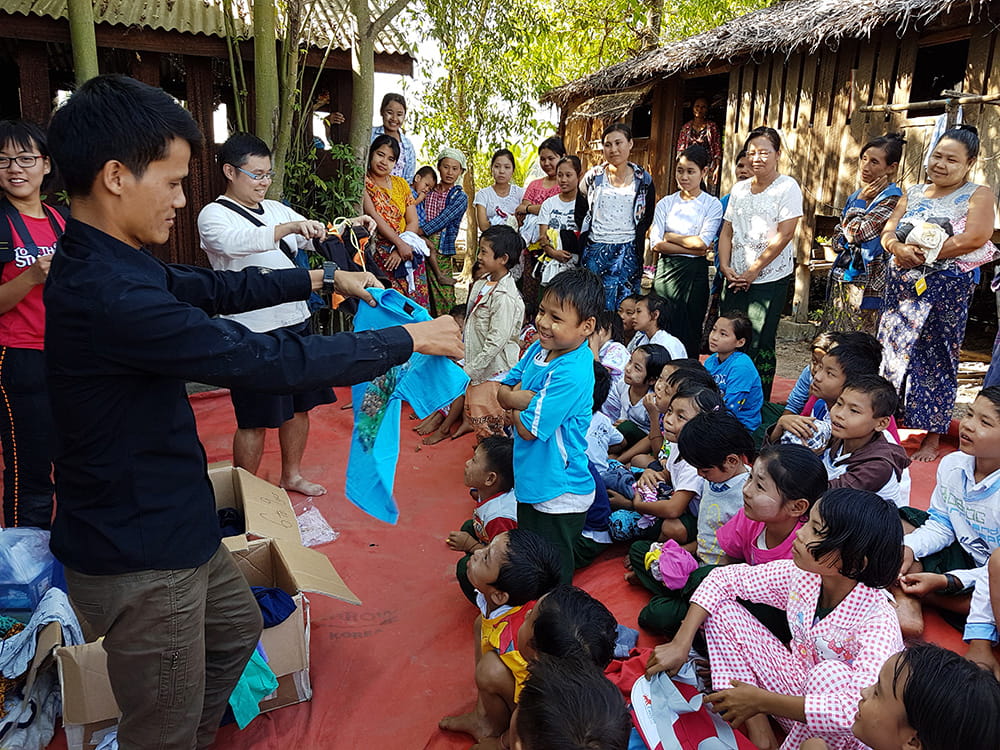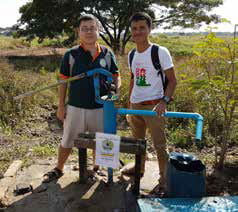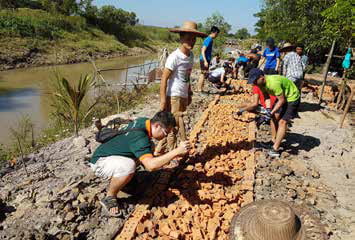Stories > Remote Access
Remote Access
A Singaporean and Myanmarese team are helping to secure the future of disadvantaged children through education.
BY Tan Keng Yao
lot of village children are keen to study, but are limited by their circumstances. What if a country’s next great leader happened to be in a village, and I didn’t do anything to help the child fulfill his potential?” These are the words of Singaporean Linus Lin.
The educator was first inspired to embark on social work in 2012 during a mountain climbing trip in Myanmar. His encounter with impoverished villagers got him thinking about how he could make better use of his position to improve the lives of others.
Keen to help, Lin – who owns a learning centre in Singapore – returned to Myanmar the following year with friends, and visited an orphanage outside of Yangon. They paved a dirt road so children would not slip and fall during rainy days. Lin also paid for two locals to teach the children English. But he was determined to do more, and started travelling to Myanmar regularly.
Each time, he would visit villagers with an interpreter in an attempt to find out where assistance was needed. He soon realised his trips to Myanmar were not sustainable due to his day job in Singapore. What he needed was a local partner who could assist in doing the groundwork. As luck would have it, Lin managed to reconnect with Joseph Bu Shwe.

Initial distrust from the locals has given way to warm response when Lin and his team visit villages on recce trips.
The two had met when Lin hired Bu Shwe as a teacher for the orphanage. At the time, the latter was pursuing a degree in Yangon, but was on the verge of giving up as he could not afford to pay his school fees.
Lin offered him a role as a partner, and sponsored his undergraduate education. This was the birth of Global Village for Hope (GVH), a charitable foundation that aims to provide an education for children living in impoverished villages in Myanmar.
The organisation works mostly with communities on the outskirts of Yangon, hiring teachers and funding bursaries. It also supplies schools with stationery and furniture, while installing solar power panels, so students have light to read. Lin rallies for donations and volunteers by posting about GVH’s work on social media channels.
“We Attempt To Build Trust By Sharing What We Did For Other Villages, And Explaining To Them Who We Are And Why We Are Here.”
Linus Lin, Founder Of Global Village For Hope
AN UPHILL JOURNEY
Since its founding in 2013, GVH has expanded its mission from education into constructing wells for villages and organising rice donation efforts. This came about when its founders realised that many villagers either had to walk great distances to obtain water for consumption or collect muddy water from rivers.
“We focus on two main things: education and basic necessities. Rice and water are basic necessities of life,” says Lin, adding that many villagers could not afford the resources to construct wells that would give them access to clean water.
Yet, his foray into social work was anything but smooth sailing. Recce trips to villages in the initial years were often met with distrust by locals, some of whom even turned nasty.
He soon found out that the villagers had a history of exploitation by individuals who claimed to be raising funds for them, but then disappeared with the money donated.
The duo had to work tirelessly to prove that they were not out to take advantage of the locals.
“We attempt to build trust by sharing what we did for other villages, and explaining to them who we are and why we are here. If the village is still not welcoming, we usually leave them alone,” he explains.
It also helped to have a local partner like Bu Shwe to break the language barriers. In the end, their dogged determination won the locals over.
“Over time, as we did more projects in Myanmar, we built up GVH’s profile,” he shares. “Now, no one questions us anymore.”
While Lin eventually earned the villagers’ trust, he also encountered cultural differences that could lead to misunderstanding. Take, for instance, the time he and his team went to a village to inspect two wells they had built, and were greeted by a simple reception set up by the villagers.
AT A GLANCE
75 children have been sponsored by GVH, which pays for their school uniforms, educational materials and tuition classes.
400 children are estimated to have taken part in GVH’s holiday camps that include non-academic enrichment classes.
30 wells have been constructed in rural areas.
1,603 sacks of rice have been distributed to villagers.
This consisted of two mats, a tiny table, and tea and biscuits cobbled together from different families. Not wanting to take anything from the impoverished villagers, Lin’s team refrained from eating anything, and their hosts were palpably disappointed.
“I realised we should have eaten something because this was the villagers’ attempt to build friendship. We probably insulted them by refusing to eat,” he recalls.
|
The work by Linus Lin (left, seen with Joseph Bu Shwe) goes beyond donation drives and volunteer recruitment. |
“It’s not easy to learn about the culture in those remote villages because of their inaccessibility. It’s not like I can go online to read about them. But my team and I grow more mature after each visit and making silly mistakes along the way. We started to learn how to see things from the villagers’ perspective and not from our own.” An example of this, he says, is how urban dwellers tend to think of wooden toilets used by those living in rural areas as primitive. “We try to help by building toilets with modern sanitary-ware. But the fact is that the villagers feel their toilets are good and clean enough. So our idea of ‘helping them’ is, in some cases, not necessary.” |
A TWO-WAY STREET
Over time, Lin has cultivated close friendships with the Myanmarese people. He recalls the time he visited Bu Shwe’s hometown, Zuitui, in the mountains.
One of the villagers found out he liked a drink called Blue Mountain and promised to buy some from town, which was an hour away from the village by motorbike.
|
Paving a dirt road to prevent children from slipping and falling while on their way to school on rainy days. |
Lin waited for four hours before the man finally showed up with the drink, after which they chatted and went their separate ways. It was only much later that the Singaporean discovered his friend’s delay had been caused by stormy weather, which resulted in a landslide along the way. The man had to carry both motorcycle and drinks around the landslide to continue his uphill journey. “Despite his efforts, he did not mention a word about it,” shares Lin, who was touched by the quiet sincerity of the Myanmarese. “I felt ashamed because I didn’t even ask him why it took him so long to come up to the village.” |
Working with Bu Shwe, too, has been a humbling experience. “I admire his hardworking spirit, his integrity and his willingness to improve,” he shares.
As it turns out, these feelings of admiration are mutual. “I learnt lots of things by working with Linus – like the value of hard work and how to see things from different perspectives. More importantly, I learnt to be positive in the face of failure,” says Bu Shwe.
Last year, GVH produced a video about its work, which was featured alongside other stories by Singapore International Foundation’s digital storytelling portal, Our Better World.
Viewers were asked to vote for their favourite video and GVH’s won. Lin and his team received $5,000, which they will be using to fund the educational expenses of 10 high school students. And they plan to be in Myanmar for the long haul, providing education to those who do not have access to it. “We want to focus on one country and make it our best effort. We will probably stay in Myanmar for the next 20 to 30 years,” Lin concludes.


